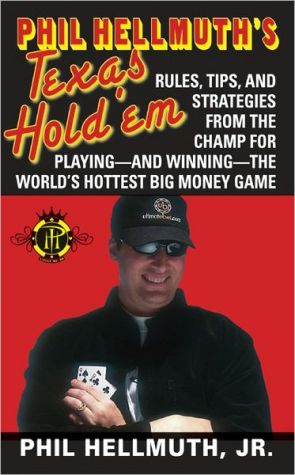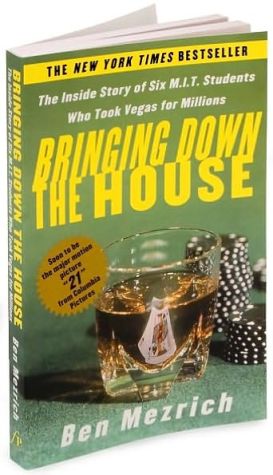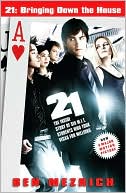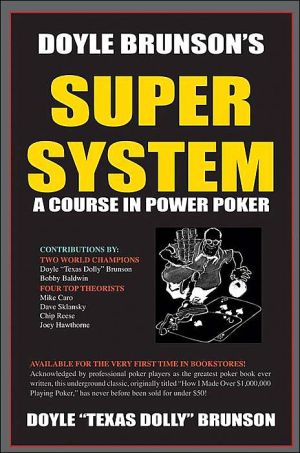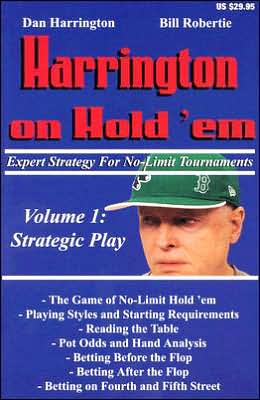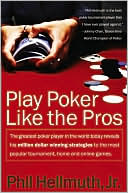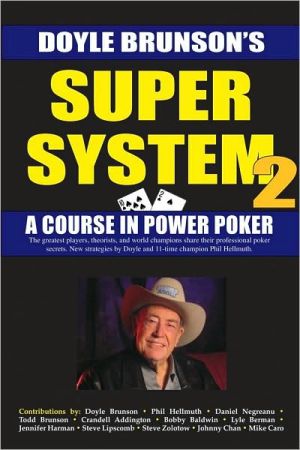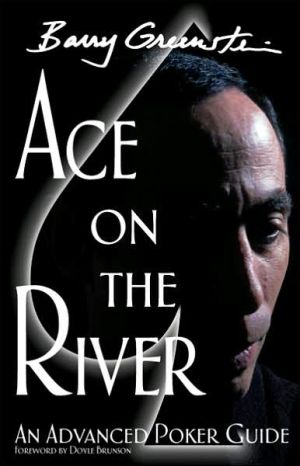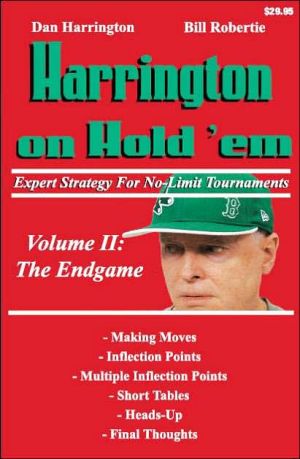Phil Hellmuth's Texas Hold'em
In Play Poker Like the Pros, poker master Phil Hellmuth, Jr., demonstrates exactly how to play and win — even if you have never picked up a deck of cards — the modern games of poker, including: Texas Hold'em, Omaha, Seven-Card Stud, and Razz.\ Phil Hellmuth, Jr., a seven-time World Champion of Poker, presents his tournament-tested strategies to beat any type of player, including:\ \ The Jackal (crazy and unpredictable)\ The Elephant (plays too many hands)\ The Mouse (plays very...
Search in google:
In Play Poker Like the Pros, poker master Phil Hellmuth, Jr., demonstrates exactly how to play and win — even if you have never picked up a deck of cards — the modern games of poker, including: Texas Hold'em, Omaha, Seven-Card Stud, and Razz.Phil Hellmuth, Jr., a seven-time World Champion of Poker, presents his tournament-tested strategies to beat any type of player, including: The Jackal (crazy and unpredictable) The Elephant (plays too many hands) The Mouse (plays very conservatively) The Lion (skilled and tough to beat) Play Poker Like the Pros begins by laying out the rules and set-up of each game and then moves on to easy-to-follow basic and advanced strategies. Hellmuth teaches exactly which hands to play, when to bluff, when to raise, and when to fold. In addition Hellmuth provides techniques for reading other players and staying cool under pressure. There are also special chapters on how to beat online poker games and an inside look at tournament play.
Phil Hellmuth's Texas Hold 'Em \ Chapter One\ Skill versus Luck in Poker\ Most people today misunderstand poker. Let's be frank: most people know poker from the low-stakes games they now play (or grew up playing) with their family and friends. In these low-stakes home games, luck often plays a much bigger role than skill.\ The money to be gained or lost in a home tends to mean next to nothing, and everyone at the table plays almost every hand to the end. The dealer's choice games are often nonstandard, even bizarre variations (often fun) where, for example, deuces, black kings, or one-eyed jacks (or all of them) are wild. In this type of poker game, people just put their money in the middle (in the "pot") and hope to make the best hand. Often, there doesn't seem to be much strategy or thought involved. When the evening winds up, everyone seems to agree that "Johnny sure was hot tonight!" You don't hear any-one saying, "Boy, did Johnny play great tonight. I sure am afraid of him at the poker table."\ One reason why luck has such a big role in homestyle poker games is that many of the skills we use in pro-style games just don't come into play in a home game. For example, three of the more important skills that we use are being patient in determining which starting hands to play, bluffing, and reading people. Patience, like discipline, is a virtue in many areas of life, and poker is no exception. It is in the nature of professional or tough high-stakes poker games that it is mathematically correct to fold a lot of hands right away. If you are playing too many hands (which equates to too many bad hands) in a tough poker game, you will often findyourself "drawing mighty thin," that is, trying to win by catching particular cards that are in short supply.\ The plain fact is that if you play too many hands in a pro-level poker game, you just cannot win, certainly not in the long run and probably not even on just one given night, no matter how lucky you are. But if you're playing a lot of hands in a home poker game, you may be in good shape anyway, because the sheer size of the pot will wind up offering you odds sufficient to draw to an inside straight (add a nine, for example, to your 7-8-10-J hand) or another "unlikely to hit" hand. You'll usually lose, but when you do manage to hit the card you need, you're going to win a huge pot.\ Further, the number of cards that can complete what you need in the late rounds of a hand in a home game is often larger than one sees in the pro game, because the dealer has designated various wild cards or rules that allow you extra draws or give you chances to buy another card or replace a card.\ Because you don't see these big pots and people paying you off with weak hands in a pro poker game, patience is crucial there. In the traditional home-style poker games, patience not only is not as important but may actually clash with the "spirit" of the game—that "We're all here just to have fun and gamble." Playing a more technically informed style may win you more money in a home game, but it might also mean that you're not invited back the next time the game is held! In a casino poker game or an online poker game, of course, you don't need to be concerned that you might not be invited back.\ Another key difference between home poker games and the games that the pros play is that bluffing actually succeeds in the pro-style games! In a home game, it's extremely hard to pull off a bluff, because you usually can't bet enough money on the last bet to get your opponents to fold. For 25 cents, someone who is convinced he is beaten is nonetheless willing to throw the two bits into the pot, just to see what you have, and, oops, there goes your attempted bluff. In fact, in most situations in these home games where there is a "bet on the end" (in the last round of action in a given hand), someone is always egging someone else on to be the "sheriff." "Bill, you call that boy and be the sheriff this hand! We can't let him bluff us!"\ In the pro game, bluffing is a sound strategy, because in the late stages of a hand there aren't many people who haven't folded. If you've been playing very few hands (that is, patiently), and have seldom been caught bluffing during a day of play, then when you do bluff, it's hard for those remaining in the hand to "call you down" through the last bet. Long live the bluff! Bluffing well is an art form, and I will be addressing it at various points throughout this book. The bluff is one of the poker craftsman's tools that is seldom available to players in wild, friendly, low-stakes games.\ Another important element in pro poker games is reading your opponents. Are they riding on "hot air" or the real thing? In a lot of home games, there is just so much money in the pot, relative to the size of the final bet, that it makes sense to call that bet. (What do you have to lose?) In pro poker, there is enough money involved, and enough actual thought processes are being utilized, that many situations come up where you can take advantage of a good read—which might arise either from your ability to detect weakness or strength in body language or from your ability to assess the implications of the betting pattern on the hand—and make either a good call or a good fold. But it's hard to read someone who hasn't really been thinking about the hand and can't possibly be nervous about losing $1.75!\ Phil Hellmuth's Texas Hold 'Em. Copyright © by Phil Hellmuth. Reprinted by permission of HarperCollins Publishers, Inc. All rights reserved. Available now wherever books are sold.
\ Matt Damon"Phil Hellmuth gave me the best poker lesson I’ve ever received."\ \ \ \ \ Johnny Chan"Phil Hellmuth is the best poker tournament player that I have ever played against."\ \ \ "Amarillo Slim" Preston"Play Poker Like the Pros is the best poker strategy book ever written.\ \ \ \ \ Doyle "Texas Dolly" Brunson"From the moment I first played poker with Phil I knew that I was witnessing something special."\ \
